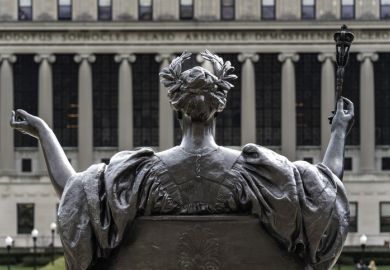For those finding themselves walking on the beach at Harlech, North Wales, with no prior knowledge of its history, the sight of the abandoned buildings of Coleg Harlech would seem out of place.
There is, perched above the Royal St David’s golf club, a brutalist theatre, echoing the turrets of Edward I’s castle up the road; a stern but pleasing arts and crafts building that would fit in well among the streets of Oxford or Cambridge; and a high-rise 1970s brutalist tower block that has elicited outrage at its very existence since its construction.
The strange mix of buildings seems awkward, but it symbolises the key periods of Wales’ only “second-chance” university. From the 1920s all the way through to 2017, Coleg Harlech provided those who had at first missed an opportunity to access further education a second crack of the whip.
The Coleg Harlech story is the triumph of a belief that, in providing students the opportunity to study a broad range of subjects (sociology, history, psychology and political science, later broadening to media studies and beyond), it would develop their capacity to free-think and might allow them the transition to university, or to return to their communities as leaders.
Consistently, the ethos of the college resisted the idea of qualifications, preferring to see what it provided as access to thought itself.
Unfortunately the curriculum also earned the college a reputation for being a “nursery of Bolshevism” which it never overcame, nor seemed to want to. Of course, there is a robust argument that the fact that colleges of this type were undoubtedly socialist in nature ensured their eventual fate.
However, it is interesting to note that Coleg Harlech – whose educational activities will end for good with the site’s sale later this month – was formed out of donations of private money, much of that coming from philanthropic business leaders. Throughout its life, the college had to fight for survival, and providing a free education (at one stage a two-year course) could not have been in any way easy to maintain.
Founded by Thomas Jones in 1927, once Lloyd George’s parliamentary private secretary and a leading supporter of the Workers’ Education Association, Coleg Harlech, despite several significant setbacks throughout its history, provided education to scores of steel workers, miners, and many others and, in latter years, those who had run into trouble in their lives.
The closure and inevitable planned sale of the site prompted existing alumni to start to gather in online groups and run meetings to discuss the future of the site.
At one meeting I attended, I was struck by just how well many of the alumni had done in life and how they underlined passionately that it would never have been possible without the help of the college. In the face of the closure last year, many of them seemed to despair in the knowledge that other generations would not benefit in the same way they did. Many of the alumni and former staff know very little about the closure and the plans are for the site, and the current owner, Adult Education Wales, selling through a Swansea-based surveyor and estate agent, wants the deal done quickly.
It is strange that the idea of dedicated second-chance colleges hasn’t gained popularity at a time when higher education institutions speak of widening access, creating foundation courses and making unconditional offers, and as a result are undertaking curriculum revisions to revolutionise the way that courses are taught. After all, to listen the rhetoric within higher education, you’d think that the values of the second-chance colleges were completely in line with the ambitions of the higher education establishment. This closure surely forces us to evaluate why funding wasn’t found to keep the place going, as it was doing precisely what universities now say that they want to do.
One significant reason for this might lie in a debate that raged almost from the college’s foundation years, which was this; did second-chance universities see themselves as pathways to higher education? The answer, certainly from Thomas Jones, was that they should not. His belief was that while this may be a desirable outcome for some students, it was also desirable to have students return to their communities and professional lives equipped to affect societal change through the newfound knowledge that they had gained.
The closure of Coleg Harlech is not just a sad conclusion to the life of a college but a totemic event that shows us clearly how our society really views education.
The college (along with other second-chance colleges) provided students, mostly from industrial areas, the space to think in beautiful surroundings, a residential setting and, without the pressure of endless examinations and assessments, the opportunity to think about wider, fundamental issues.
What we gained from this were individuals who thought freely and who went on to bring value to society in many ways.
We may not have gained student fees, but our investment in second-chance colleges returned profits that we no longer seem to value.
Sam Christie is a freelance documentary filmmaker who is currently working for AMP Media in Aberystwyth on a film about Coleg Harlech.
Register to continue
Why register?
- Registration is free and only takes a moment
- Once registered, you can read 3 articles a month
- Sign up for our newsletter
Subscribe
Or subscribe for unlimited access to:
- Unlimited access to news, views, insights & reviews
- Digital editions
- Digital access to THE’s university and college rankings analysis
Already registered or a current subscriber? Login








